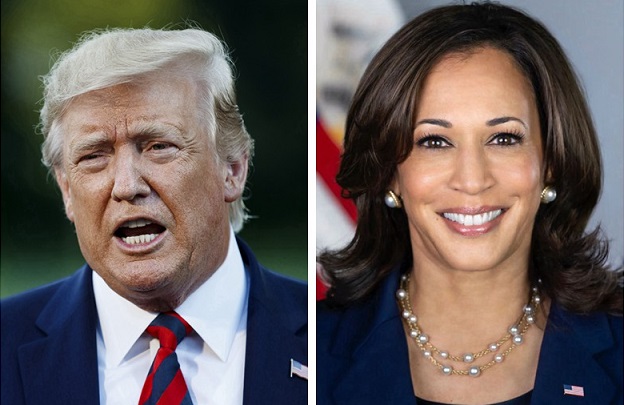
WASHINGTON | Xinhua | Roughly two months before the U.S. elections, neither of the two presidential candidates has outlined an overarching policy that would address crucial economic problems of the country.
LACK OF POLICY DETAILS
The race between Vice President Kamala Harris and former President Donald Trump is tight, with no clear winner in sight. With most Americans focus on the economy, neither candidate has detailed a plan to deal with food inflation, the nation’s massive debt or other major economic concerns, experts said.
Both candidates have outlined piecemeal policies — Harris has focused on child tax credits and affordable housing, and Trump has made vague statements about tackling inflation — but there have been no announcements on a cohesive economic strategy.
“Each of the candidates has announced several economic proposals but neither has put forward detailed plans,” Brookings Institution Senior Fellow Darrell West told Xinhua.
Greg Cusack, a former member of the Iowa House of Representatives, told Xinhua that he hasn’t found either Harris’ or Trump’s proposed “economic policies” to be either many or fulsomely explained.
“In Trump’s case, it is not just that he lacks any detailed plans — he seems to almost always be ‘winging it’ to adapt to suit the changing directions of the winds — but also that the policies he genuinely intends to pursue, like tax breaks for the wealthy and cuts to subsidies for the poor, hungry, and homeless, are not ones that if spoken would be received well,” said Cusack, a longtime Democrat.
Harris, meanwhile, “needs to be careful about providing too much specificity since — in the country’s current non-thinking, tribal mood, they would only play into the Republican’s playbook that what she is really about is tax and spend,” said Cusack.
NO PLAN FOR DEFICIT REDUCTION
Some economists note the elephant in the room: the nation’s soaring budget deficit.
Harris has proposed expanding the child tax credit and supporting first-time homebuyers, but she has not explained how she plans to fund her economic proposals.
Trump, meanwhile, has proposed eliminating taxes on Social Security benefits, but he also has not explained how he would cover the costs.
Trump has also proposed pushing for a new round of tax cuts while promising to reduce federal debt by stimulating economic growth. However, he has not provided specific methods for increasing federal revenue to offset the decline in tax income, making his promise to reduce federal debt likely to remain an empty pledge.
“One of my main concerns about this year’s election campaign is that neither Donald Trump nor Kamala Harris are addressing the issue of how to put the country’s public finances on a more sustainable footing,” Desmond Lachman, a senior fellow at the American Enterprise Institute and a former official at the International Monetary Fund, told Xinhua.
According to the Congressional Budget Office, the nation is on track to have a higher public debt-to-GDP ratio by 2027 than at the end of WWII, when the ratio reached an all-time high. That was when the United States had spent massive sums to fund its part in the largest military conflict in world history.
“Instead of discussing ways to reduce the budget deficit, both candidates are making campaign promises that will likely exacerbate our public finance problem,” Lachman said.
Trump will do this by unfunded tax cuts and Harris will do this by unfunded public spending increases, Lachman said.
NO VIABLE PLAN FOR INFLATION
Meanwhile, at a time of surging inflation — mainly high food, rent and gas prices — neither candidate has come up with a viable plan to tamp down prices to an acceptable level.
Food prices rose in the United States by 25 percent from 2019 to 2023, according to the U.S. Department of Agriculture. The bulk of the increase began in mid-2020, when the country was mired in the COVID-19 pandemic, and the Biden-Harris administration rolled out massive fiscal stimulus.
Trump said he will drill for oil in the United States, as the nation boasts one of the biggest oil reserves worldwide. The former president said this will bring down inflation. But many economists said this will not fix the problem.
At the same time, Harris has raised eyebrows by announcing she would implement price controls to address what she claimed was corporate price gouging. But economists said price fixing would not help tame inflation and could even cause more of it.
Research published in May by the Federal Reserve Bank of San Francisco indicated there was little evidence that price gouging is the main cause of inflation, despite Harris’ claims.
On trade policy, Trump has called for more tariffs, and the current administration has kept many Trump-era tariffs in place. But critics said such policies could put a dent in Americans’ wallets, even as consumers continue to battle inflation.
Polls are mixed about the degree to which Americans trust either candidate on economic issues. Some polls have Harris ahead and others have Trump in the lead. But inflation remains a political weakness for Harris.
Betty Lewis, 68, a retiree in the state of New Jersey, told Xinhua she is “concerned” about prices at the grocery store during Harris’ time as vice president.
“I’ve never seen something like this,” she said. “People get to the checkout line and they have to put things back because they can’t afford them.”
She lives in an area with a large number of retirees living on a fixed budget, a group that has been disproportionately harmed by price increases.
Chris Roland, 36, an IT consultant in the state of Maryland, told Xinhua that Harris is “too connected” with the current administration, which he blames for the most rapid inflation in four decades.
VIBE VS POLICY
Some analyses, however, suggest that in U.S. elections, winning votes does not rely on policy details.
“Presidential campaigns don’t view policy details as winning messages in and of themselves, however, but as elements of a broader story about who their candidate is and why he or she has the credibility to accomplish what’s being promised,” according to an article by The Wall Street Journal.
Christopher Galdieri, a political science professor at Saint Anselm College, told Xinhua that he doesn’t think issues matter as much as perceptions of the candidates.
“In 2016, enough voters in those states found Trump culturally similar to themselves to give him modest wins in all three swing states of Pennsylvania, Wisconsin and Michigan; four years later, Biden capitalized on discontent there to do the same,” Galdieri said.
“Winning in these stats will require convincing voters that a candidate is on the side of the people in those states, but each campaign is going to have different ideas of what that means,” Galdieri said.
This helps explain why Democrats repeatedly highlighted Harris’ experience as California Attorney General at the recent Democratic National Convention in Chicago. Harris’s campaign team aims to reinforce her image as a prosecutor who advocates for the public good, hoping that voters will trust her based on her track record and believe that if she is elected president, she will keep her promises and protect the interests of working-class people.
CNN recently noted that Harris’ campaign has so far been “heavy on vibes but light on concrete policy.”
“Folks don’t vote for 10-point plans,” Patrick Gaspard, a policy guru and head of the Center for American Progress, said in an interview with Bloomberg News during the Democratic National Convention. “Every election for the last 200 years has been a vibes election.” ■
 The Independent Uganda: You get the Truth we Pay the Price
The Independent Uganda: You get the Truth we Pay the Price


